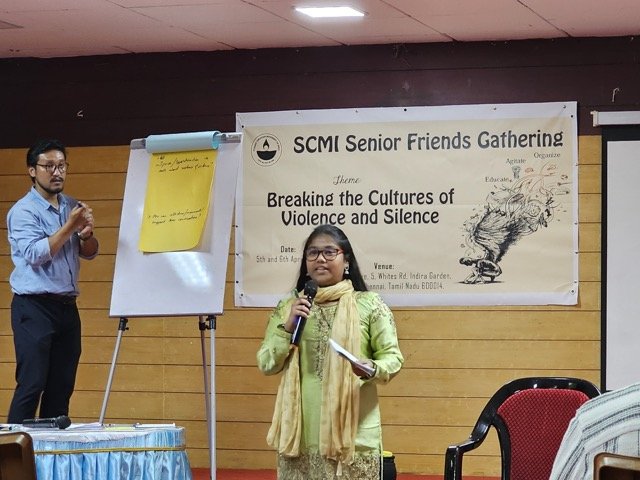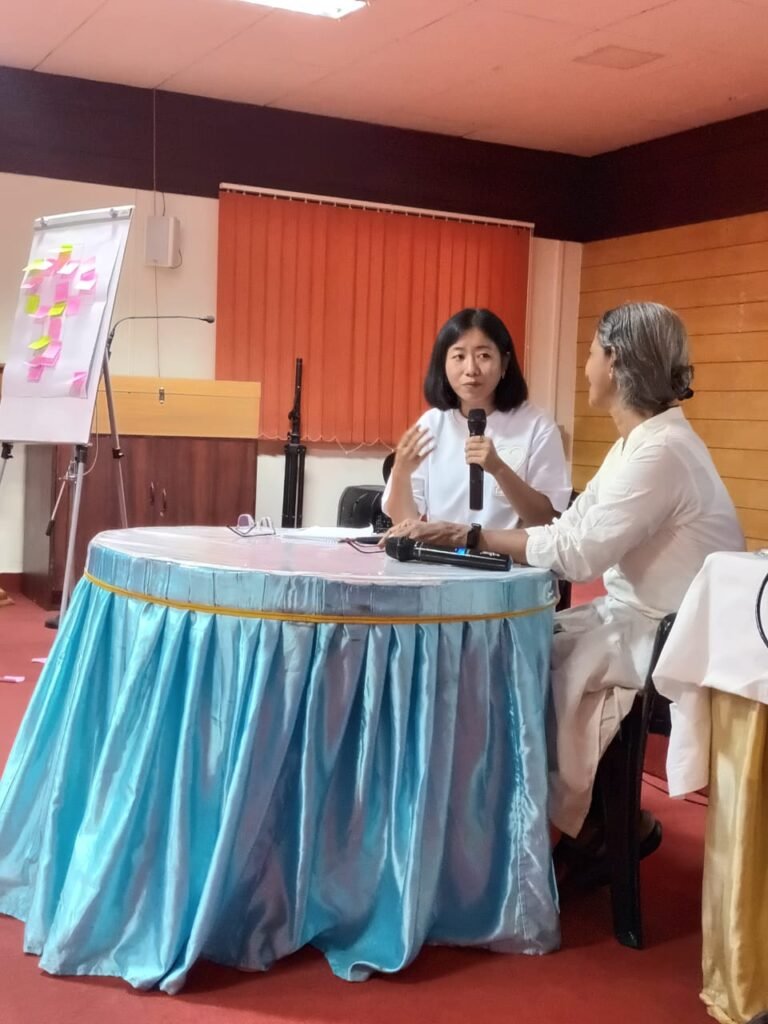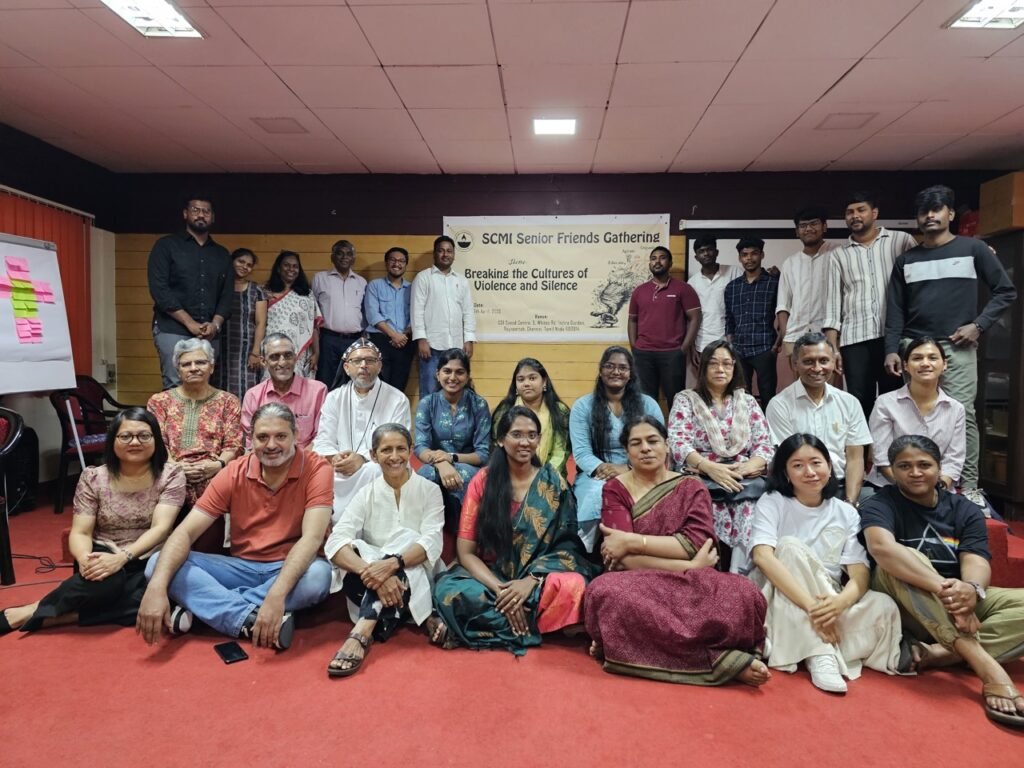

The overwhelming cultures of violence and silence of both the society and faith communities, especially churches, compel us to embrace “breaking” or “dismantling” as an appropriate form of discipleship. While these expressions may sound demanding and disturbing, these necessarily echo the mission of Christ who through his death on the cross challenged and dismantled the walls of division and hostility (Eph.2:14) and called us to a ministry of standing with the poor and the marginalized (Matt 25: 34) and reconciliation and restoration (2 Cor. 5: 18,19).
We recognize the many forms of violence in our midst – social and economic injustice, violation of dignity and rights, displacement of people, domination, division and discrimination of vast populations, and the destruction of the earth. We particularly acknowledge the violence of the neo-liberal economy that gives rise to the free market causing “unfettered misery” to the poor of this world. By denying the humanity of the marginalized sections, it favours a minuscule minority of the very wealthy who are able to garner more and more wealth into their hands. Consequently, poverty, exploitation and destruction of the earth and its resources are the stark expressions of this violence.
Other glaring expressions include the violence of nationalism, often promoted by the majority ideologues and their parties in power in many parts of the world. In the Indian setting, religious minorities, particularly the Muslim community, face untold attacks and discrimination. Increasingly, incidents of violent attacks on Christians and their places of worship have become a cause for concern. The violence of patriarchy, based on the logic of a binary understanding that hierarchicalizes human relationships and legitimizes violence against women and children is a marked feature of every community irrespective of religious differences. Adding to this, the violence of the caste system remains a persisting stain on the Indian social fabric and the injustice and the cruelty it promotes continue to be the most heinous crimes against millions of people who are deemed to be lower in status, considered polluting and therefore denied their basic human rights.
The pervasiveness of violence in its different expressions makes it a culture and it becomes more gruesome when it colludes the culture of silence. When individuals and institutions prefer to remain indifferent to the life-denying forces that operate before their very eyes, the culture of silence gets normalized, leading to the normalization of the culture of violence.
Unfortunately, many religious institutions and faith communities seem unperturbed by these cultures and choose to remain silent in the face of evil. Some even prefer to be their legitimizers. The interplay of violence and silence raises many unsettling questions and addressing them becomes possible only with a shift in consciousness. This implies nurturing a
new consciousness that affirms the dignity and equality of all humans and paying heed to the cry of the earth and its creatures. Drawing from the feminist and Dalit consciousness could help find ways to break these cultures of violence and silence.
These widely prevalent cultures of violence and silence call us to introspect critically about our positioning before this phenomenon. Do we remain mere spectators who are unaffected by the suffering of those who are victims of injustice and exploitation? As Christians, we are invited to look at Jesus Christ who repeatedly broke the silence before the systemic violence mediated mainly by the religious and political powers of his times. Even as a sense of despair and hopelessness further accentuated by the increasing tolerance of violence and injustice prevails in this world, as Christians seeking to follow Jesus Christ closely, we are led to an active hope – a life of discipleship that upholds justice and compassion (Micah 6:8) and witnesses to God’s promise of life for all. (John 10:10).
Breaking cultures of violence and silence, therefore, implies a conscious moral and spiritual response in favour of life – to dismantle and overthrow the life-denying cultures and structures, and to plant and nurture a culture of life and new possibilities. (Jeremiah 1:10). We cannot be bystanders or choose to remain as victims but be bold enough to put spokes in the wheels of injustice and violence. Such courage and commitment come from our understanding of being a new humanity in Christ – to be a counter-cultural movement, an alternative community, exploring new paths, accompanying those in struggle and suffering, and partnering with those already on the way, and constantly at work for a world that offers life with justice, peace and dignity for all.
It is time to assert the church as people – young and old, clergy and laity from different identities and locations to affirm God’s creative diversity. Faith in God compels actions of love, justice, compassion, freedom and opportunities for all. As such, breaking the cultures of violence and silence is a moral and spiritual imperative for the affirmation and practice of Christian faith now and always.
“Faith in God compels actions of love, justice, compassion, freedom and opportunities for all. As such, breaking the cultures of violence and silence is a moral and spiritual imperative for the affirmation and practice of Christian faith now and always.”
Said the Annual Gathering of the Indian Christian Collective for Justice on the theme: Breaking the Cultures of Violence and Silence in Chennai on April 5 & 6, 2025
ICCJ- (Indian Christian Collective for Justice) is a collective of Christians – activists, social scientists, academics, writers, artists, theologians, church workers, youth and students and all such who are engaged in actions, advocacy, study and writing to uphold and promote values that are crucial for a just, free and inclusive society.
Indian Christian Collective for Justice
info@iccj.net

